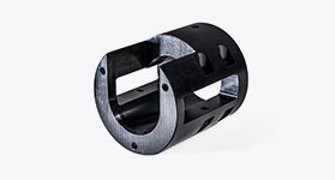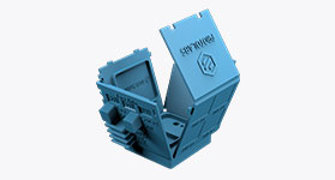Nylon: Understand the Key Benefits and Applications
Nylon is a versatile material that offers strength, durability, and chemical resistance
It’s a great choice for a variety of industries and applications. Multiple grades of nylon are available at Protolabs through the following manufacturing services:
Advantages of Nylon
- Strength and durability: Known for its high tensile strength, nylon is strong and highly durable. It can withstand heavy loads and is resistant to wear and tear.
- Lightweight: Nylon is suited for applications where weight is a concern. It provides strength and performance without adding significant weight.
- Flexibility: This material can be easily molded into various shapes and forms and can be extruded into fibers or manufactured into solid objects, giving it versatility for different industries.
- Resistance to chemicals: Nylon is resistant to many chemicals, including oils, greases, and solvents, and is it suitable for use in applications where exposure to chemicals is expected.
- Low friction coefficient: it has excellent self-lubricating properties and is useful in applications where reduced friction is desired, such as bearings, gears, and conveyor belts.
Disadvantages of Nylon
- Water absorption: It tends to absorb moisture from its environment, which can affect its mechanical properties. When exposed to water, nylon can become weaker and more prone to deformation. However, this can be mitigated by using moisture-resistant variants of nylon or through proper treatment.
- UV degradation: Nylon is susceptible to degradation when exposed to prolonged sunlight or ultraviolet (UV) radiation. Over time, UV exposure can cause discoloration and reduced mechanical properties in nylon products. UV stabilizers can be added to mitigate this issue.

Applications for Nylon
Nylon is a versatile material that is suitable for a wide range of products across various industries. Here are some common types of products made from nylon:
- Industrial components: Nylon's strength, durability, and low friction coefficient make it suitable for various industrial applications. Nylon parts are used in gears, bearings, bushings, rollers, pulleys, conveyor belts, and seals. It is also used in automotive components, such as fuel tanks, engine covers, air intake manifolds, and radiator end tanks.
- Electrical and electronics: It’s used extensively in electrical and electronic applications due to its excellent insulation and chemical resistance properties. Nylon is used in wire and cable insulation, connectors, switches, circuit breakers, and electrical enclosures.
- Consumer goods: Nylon is found in numerous consumer products, including bags, backpacks, luggage, umbrellas, tents, ropes, and straps. It is used in the production of sporting goods like tennis racket strings, fishing lines, and hiking boots. Nylon bristles are commonly used in toothbrushes and brushes.
- Automotive parts: Nylon's low weight, durability, and chemical resistance make it suitable for various automotive components. It is used in interior parts like dashboards, seat belts, carpet fibers, and airbag fabrics. Nylon is also used in under-the-hood components like fuel lines, engine covers, and coolant reservoirs.
- Medical devices: Often used in the medical industry for producing devices such as catheters, surgical sutures, wound dressings, and prosthetic components, certain specialized grades of nylon offer biocompatibility, strength, and flexibility required for medical applications.
- Packaging materials: Nylon is used in the production of packaging materials such as films and bags. Nylon films are used in food packaging to provide barrier properties, moisture resistance, and puncture resistance.

Nylon is known for its strength, durability, and chemical resistance.
Plastic Materials Similar to Nylon
There are several materials that are like nylon in terms of their properties and applications. Here are some common materials that share similarities with nylon and how they differ:
-
Polyester: Polyester is a synthetic fiber that shares many similarities with nylon. Like nylon, polyester is strong, durable, and resistant to wrinkling and shrinking. However, polyester is less prone to moisture absorption compared to nylon. It is also generally more resistant to UV radiation and has better colorfastness. Polyester is commonly used in textiles, apparel, home furnishings, and packaging.
-
Polypropylene: Polypropylene is another synthetic polymer that shares some similarities with nylon. Like nylon, polypropylene is lightweight, durable, and resistant to moisture and chemicals. However, polypropylene has a lower melting point than nylon, making it less heat resistant. Polypropylene is commonly used in applications such as packaging, automotive components, fibers, and ropes.
-
Polyethylene: Polyethylene is a thermoplastic polymer that shares some similarities with nylon. It is lightweight, durable, and resistant to chemicals and moisture. However, polyethylene is generally less strong and has lower heat resistance than nylon. Polyethylene is commonly used in applications such as packaging, containers, pipes, and films.
-
Polyurethane: Polyurethane is a versatile polymer that shares some similarities with nylon. It is known for its strength, flexibility, and abrasion resistance. Polyurethane offers excellent resistance to oils, solvents, and chemicals. However, polyurethane is typically more expensive than nylon. It is commonly used in applications such as coatings, adhesives, foams, and elastomers.
While these materials have similarities to nylon, each one has its own unique properties and characteristics. The choice of material depends on the specific requirements of the application, such as strength, flexibility, heat resistance, or chemical resistance. Consider these differences when selecting a material for a particular use case.
More Resources











